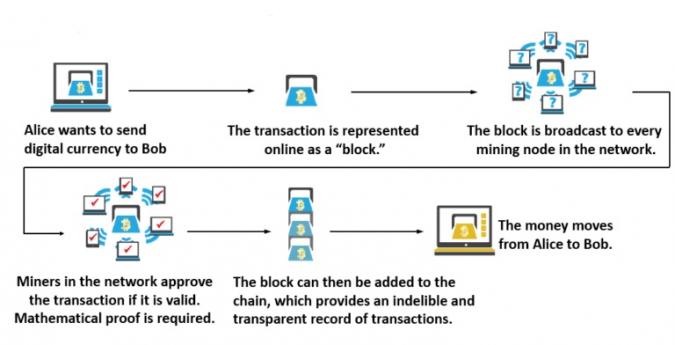

Blockchain is a decentralized database that stores a ledger of assets and transactions across a peer-to-peer network. In the popular imagination blockchain is associated with the Bitcoin cryptocurrency, but blockchain itself is a technology for transaction assurance. The asset or value transferred could be anything. Much of the brainpower devoted to blockchain since it appeared in 2009 has been invested in applications for financial transactions, but there are some obvious potential applications for manufacturing firms, and these center on supply chain visibility.
The key term in the above definition is decentralized. Transactions (transfers of ownership) are usually intermediated. That is, an intermediary in a transaction (such as one or more banks), provides assurance of identity, ownership, and creditworthiness to counterparties who otherwise would not trust each other in the transaction. This (centralized) intermediation function provides value in that it facilitates commerce (transactions), despite the unsavory connotations of the word “middleman”.
There are several high profile blockchain pilot projects going on now for supply chain and logistics. ARC’s Steve Banker describes several of them in a recent article. Since Steve wrote that article the MediLedger Project was announced for pharmaceutical supply chains, with Pfizer and Genentech participating. Pharmaceuticals are a natural sweet spot for advanced supply chain visibility. Reasons for this include long drug patent periods, multi-billion dollar annual sales of major prescription products, and the sheer simplicity and negligible cost of creating counterfeits.

So why do we still rely entirely on trust when we buy prescription drugs? Why not track ownership of units of (for example) Lipitor the same way cryptocurrency holders track Bitcoin ownership? There are several aspects of supply chains where I don’t understand how the success of Bitcoin’s blockchain can be replicated for supply chains. These are:
In the Bitcoin ecosystem the miners are the (multiple) entities who validate the integrity of the blockchain. Bitcoin miners enable the system to be decentralizedrather than centralized. The fact that there are many miners insures that the blockchain data is valid. A malicious miner who tried to publish a false ledger would be overruled by the vast majority of other minors who would publish the correct ledger. Miners are compensated (in Bitcoin) for rapidly publishing the correct ledger. As the demand for (and value of) Bitcoin has grown, so have the incentives and rewards for miners. How can this critical function be incentivized and executed in a decentralized manner for a supply chain application?
A blockchain provides a complete record of asset ownership at each point in time. Are there downsides to transparent publishing about the ownership of real assets (as opposed to financial ones)? I believe so. Supply chain and logistics are an important part of business strategy that manufacturers might wish to keep proprietary for competitive reasons.
It’s not “all or nothing”. For purposes of anti-counterfeiting, solutions utilizing blockchain are just one of several alternatives. For pharmaceuticals (like the Lipitor example) another alternative might be a combination of different types of unit packaging combined with bar-coded or RFID unit identification. If cost didn’t matter in such value equations, then Walmart’s 2003 RFID mandate would have succeeded as planned.
I’m NOT saying that blockchains won't become extremely valuable for manufacturing, supply chain, and logistics applications. But if they do, the above questions are some that the pilot programs will answer.

